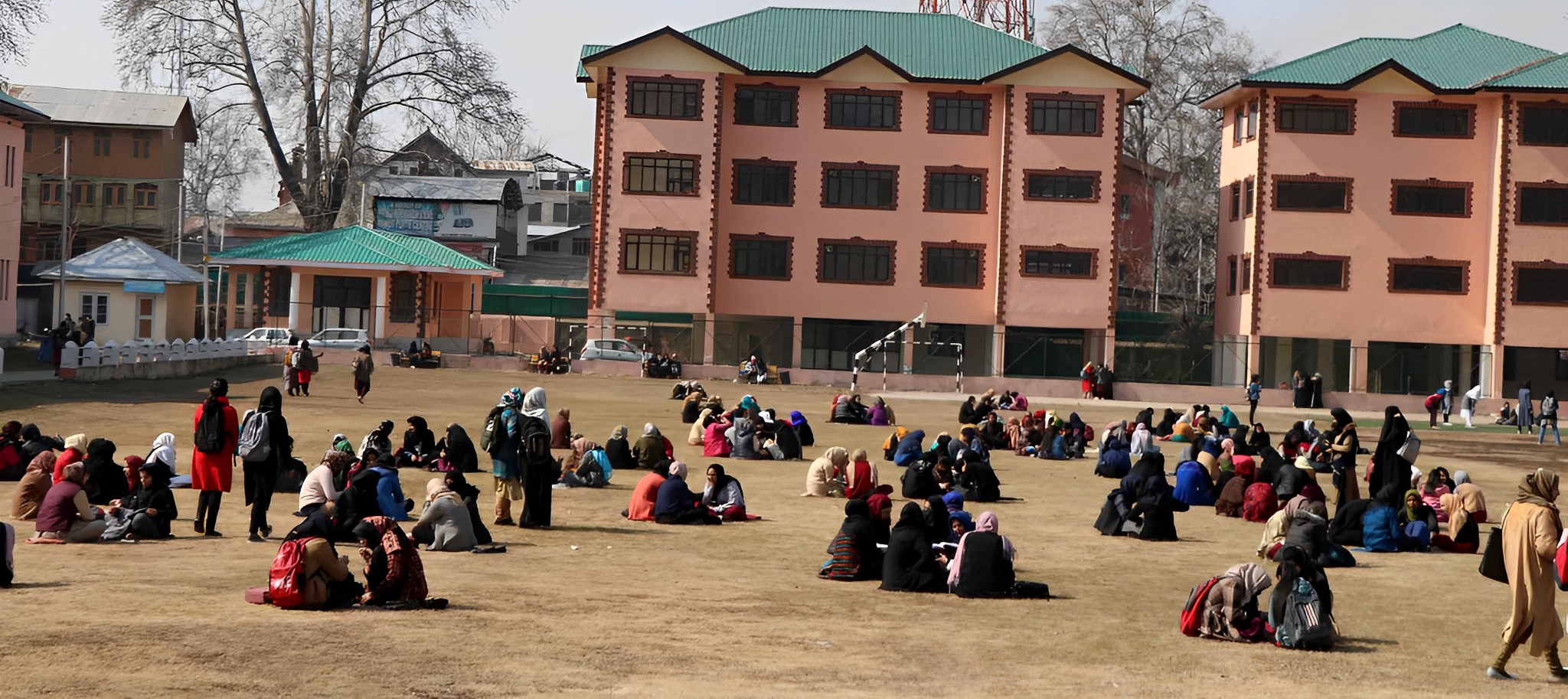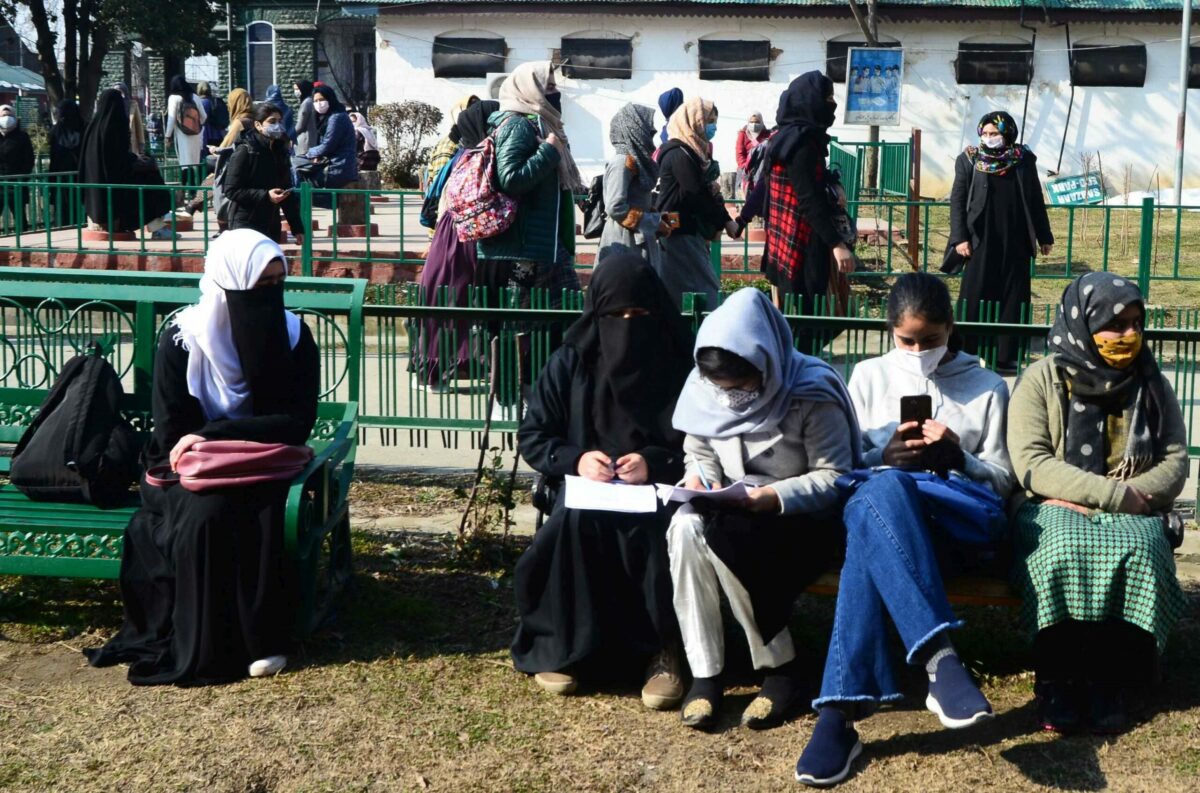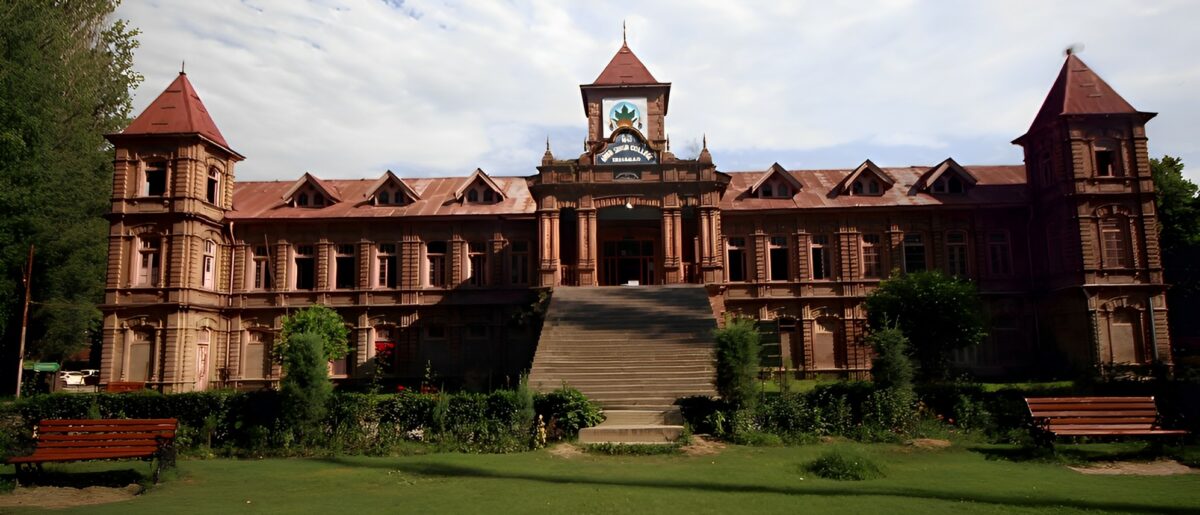With a huge network of colleges and a lot of enrolment, the students are dissatisfied with the pace and process of the education they get, reports Babra Wani

With her eyes glued to her mobile, Saima (name changed) is watching a lecture on Scaler and Vector quantities. With the uncertainty of the presence of teachers in her school looming large, she has been preparing for her upcoming examination virtually.
A student of Government Degree College, Kangan, Saima prefers not to attend the college where she is enrolled for BSc. She stopped going to her college because of the “lack of permanent staff for her subjects.” The deficit was managed by contractual lecturers, who leave the college when their contracts expire. “I mean if we talk about the present, we have no teachers there and our exams are about to begin in a month,” she said.
The lack of permanent teachers and staff is not a one-college problem but a pan-higher education issue in Kashmir. It literally triggered a sort of a “scandal” when a college principal formally ordered teachers from unrelated subjects to “engage” students in absence of the relevant faculty.
Karnah Story
Just like Saima, Zahra (name changed) is concerned and worried about the lack of teachers. A fifth-semester BA student at Government Degree College Tanghdar, Zahra recalls how she was a happy girl when she passed her higher secondary examinations just to get admission to the college. The excitement, however, soon went down as she realised the harsh realities.
“Living in a remote area was already challenging enough,” Zahra said. “We already knew that our college will not provide us with the facilities but we never knew that our issues will never be even heard.”
For her, the lack of permanent staff is her biggest concern. “Due to staff issues, we suffer from a lot of academic loss as we are not able to cover the whole syllabus and hence rely completely on self-study to prepare for examinations,” Zahra said. “Ours is a remote area so if we students face any problems here, they are rarely addressed.”
Located some 67 km north of Srinagar, beyond the Sadhna Pass, Tanghdar(Karnah) is located literally on the line of control (LOC). The area remains closed for most of the winter and there are cases when the authorities had to retain the dead in mortuaries till the road opened. The college, established in 2008 has more than 700 students on its rolls. This load is being managed by seven permanent teachers and three contractual teachers!
The Tulail Story
For 20 years old Adnan (name changed) walking for five kilometres to reach the college seems to be a daily routine. In 2019, when he and his friends heard about the establishment of a degree college, they were excited. They thought their hardships will now slow down. “We just have two permanent teachers here, one for history and one for English,” Adnan said.
For more than sixty students enrolled with Government Degree College Tulail, there are only six teachers, with two permanent and four contractual. Located at a distance of 200 km from Srinagar, Tulailis part of Gurez, the new destination for naya Kashmir tourism. The college was established in 2019.
Supposed to help residents not to migrate – as most of Gurez lives between Bandipore and Srinagar, the college could have hugely contributed. Students, however, insist this is not the case.
“We have a history teacher, right?,” one student pointed out. “History as a subject is not taught here. I mean we have other subjects here but not history so technically we have no teachers to study from.”
These teachers engage students in classes organised on a shift basis. Students insist they have bigger issues. “We do not even have our separate principal. The principal of our college watches over two different colleges (the other one is at Dawar), we neither have professors, principal nor facilities here,” Adnan who is currently studying in BA third semester said.
Due to the lack of facilities, mostly a shortage of teachers, students prefer to stay home. This, they do after paying fees and costs for the degrees. Days ahead of the examination, the colleges start assessing attendance and enforcing shortages on them. “Tell me how does it make sense that students travel long distances for hours together, jeopardising their health to study here but there are no teachers? Not even a single official has ever visited us, we have been left to the mercy of the Lord,” a visibly upset Adnan complained.
The lack of staff is not the only issue for the colleges in Gurez. “Last year, when we were writing our examinations, we knew we were appearing for three subjects,” Adnan said. “It was during the examinations that the college told us we have to appear in two more subjects – the subjects we never knew. We were desperate for what to write and a day before we had to write the examination, they sent the syllabus of that subject.”

The Kashmir Plains
The staff crisis is not a high-altitude issue. Even the colleges within and around Srinagar are suffering.
In Government Degree College, Sumbal, the students said the teachers for skill enhancement courses, which have been recently introduced, are not permanent. They are contractual and keep changing. “The continuous cycle of changing of these contractual teachers results in a month-long gap in the session,” one student said. “The month is wasted which is worrisome as it affects our studies.”
The Sumbal College was established in 2010 and has an enrolment of more than 2500 students. In the neighbouring degree college at Hajin, students are crying for a physical education teacher.
A Teacher Deficit
Subsequent governments in Jammu and Kashmir have gone into the creation of a huge network of colleges. Some villages that had put up huge struggles to get their middle schools upgraded into high schools are now addresses for the new colleges. There were around 161 colleges for general education with an overall enrolment of 151478 students manned by 5745 teachers by the end of 2020-21. With the onset of the National Education Policy (NEP-2020), the government made huge plans about improving higher education. It included making five autonomous degree-granting colleges into Multidisciplinary Education and Research Universities, a sort of deemed universities. In fact, the government said three are already operating as autonomous colleges. There was a focus on skill and innovation.
Under NEP-2020, 30 colleges have been identified for the start of research and designated as Hub colleges. These are supposed to provide basic facilities of infrastructure and logistics to the rest of the colleges in their catchment.
On the ground, however, nothing much is visible. “How can these colleges become research centres, when prestigious colleges like Amar Singh College are yet to grant the right to its first and second-semester students to get into the library,” one student, speaking anonymously asked. “Students have been desperately seeking library cards but we are told the access to the library is permitted to higher semester students.”
The NAAC accreditation is the new mad race within colleges in which the assessment is mostly based on the infrastructure and the results – nobody is seeing, if at all, the students are taught in classrooms. Officials said 55 colleges in Jammu and Kashmir are NAAC accredited 17 more will be added to the list by December 2023. By 2025, 70 old colleges will be NAAC accredited.
Right now, most colleges are battling the faculty issue. This triggered a controversy when the management of a state-run women’s college in Baramulla asked the faculty from unrelated subjects to engage “classes of the departments (currently) without staff”.Teachers from Education, Physical Education, and Sports were asked to engage in the classes of Political Science; Chemistry faculty was assigned Public Administration; Botany teachers were supposed to engage in Economics; the Zoology department was given Social Work and Mathematics was to manage the Philosophy students.
This was the outcome of the higher education department not filling the vacancies on a temporary basis by the middle of March, almost a month after the colleges opened after the winter break. It created a sort of scandal and the college principal was asked to amend or withdraw the order. As it did not happen, the authorities issued a show cause notice. Insiders said the college asserted that the faults are at the policymaking level and not the college level.
A Generation Lost
For the last nearly two decades, the higher education department has been hiring teachers on an academic arrangement basis against a consolidated sum. They are disengaged every season. They lack any rights to leave, provident fund and other facilities that permanent faculty enjoy. Over the years they have been the main players in the higher education department.
“Every year, the government used to hire 800 to 1000 teachers on an academic arrangement basis,” Dr M Yousuf, one of the contractual lecturers said. “With the NEP, the requirement might have gone slightly up, maybe up to 1200.”
For a very long time, there was a rule in Jammu and Kashmir government that if somebody worked for the government for seven years, he or she has a right to be permanently hired. They had gone to court with the plea and secured an order directing authorities to ensure the people are not disturbed. So, every year, the government would hire them on priority. Post-2019, the government stopped extending this courtesy to them and instead started hiring new faces. Some of the contractual impacts by this decision in Jammu went to the supreme court and secured an order. Yousuf said while the order was implemented in Jammu, it was breached in Kashmir. Now, they have gone to CAT and are expecting a positive decision.
“This crisis ended up almost destroying their career of nearly 500 contractual teachers –mostly PhDs’, who served the department for 15 t 20 years and then the government stopped hiring them and they crossed the age bar,” Yousuf, one of these candidates, said. “Now we are no-bodies, we gave our entire life to these institutions and now we have nothing to do.”
Yousuf said the delay in hiring teachers on an academic arrangement basis is the main issue that is hitting the colleges right now. “There is a set norm for how many students a teacher must have but I know cases, where one teacher is assigned 600 students.”
Transportation Facilities
Teaching is just one part of the crisis. Students allege, there are other issues as well. Transportation is a key factor. Though almost every college has a transport facility, quite a few busses move out of the college.
“Some students in my college walk a distance of around 26 km to reach the college,” Adnan said. “Why we do not have the transport facility as other colleges have.”
In Government Degree College Kangan, the students have a similar complaint. “We have no transportation facility here, I mean that is basic,” one student said.
Various colleges have buses but lack the funds to hire a driver. In certain cases, they have drivers but not enough money to fuel the bus.
In the newly established Government Degree College Hajin, students allege the ground is in puddles, “Whenever it rains, the ground accumulates water and it becomes difficult to even walk through it let alone be any other thing,” Ahmad (name changed) who is currently enrolled in arts stream in the college said, “We don’t even have proper classrooms. In the main building only a few classes are taught, the rest of the classes are conducted in a hut which has a couple of rooms.” Besides, he said there is still an old building, which used to be a middle school in the past, on the ground there.
“Even if available, the washrooms are not located in proper settings,” he said.
Government Degree College Hajin is one of the 52 new colleges which were established in the year 2019.
City Colleges
Zubair (name changed) and his friends made a decision to get admitted to Amar Singh College, a prominent city college. As soon as he joined the first semester his perspective changed. A student in the second semester at present, Zubair had a list of issues to share, “You know there is no punctuality, I mean the classes are never conducted on time. The teachers are always late and never on time.”

The college, Zubair added, lacks hygiene, has dirty desks in classrooms, unclean washrooms and abundant stray dogs. This is in addition to the staff shortage. “We have been waiting since March for the teacher, as the contract of our previous teacher expired,” he said. The lack of mics in the classrooms is yet another concern for the students. “The classrooms are huge and the teachers are not audible to everybody in the class.”
The students said they have no access t the library. It has been done so easily. The college has not issued identity cards which are basic to entry into the library.
“This college has no proper gatekeeping and outsiders who are not even enrolled in our college get in and fight with the students of our college,” one female student said. “There is nobody who can check the people getting in.” Students confirmed the drug-peddling boys moving around.
Students of Women’s’ College Nawa Kadal alleged that the government is frequently shifting their principals. This, they said, is impacted the college.
In Women’s College MA Road, the students complained how the focus has been more on extra-curricular activities and not on education, “The classwork always suffers the most.”
Officials Admit
College managers and insiders admitted to the lot of issues they are facing. However, they insist they are not supposed to talk the way they used to talk earlier. Some of them agreed to talk in utmost anonymity.
“Yes, there is no college bus for students and the majority of the faculty positions are vacant except English and History,” echoing the thoughts of the students an official posted in Government Degree College, Tulail said. The official added that they have tried bringing it to the notice of authorities from time to time, “We had taken up the matter with our ex-principal secretary and he told that they were ready to sanction the college bus but it was not possible to engage any driver as there is a blanket ban on contractual or local fund recruitment.” He also lamented over the trend of teachers from Gurez and Tulail ensuring they are transferred to other places outside Gurez. “What can we expect from the teachers who are hired on a contractual basis.”
Most of the college managers approached to offer their side of the story but refused to talk. “Maybe next time,” one college principal said.
















If there is a shortage of teachers why does not the government appoint permanent teachers even when there is a job crisis in Kashmir.